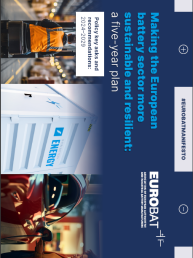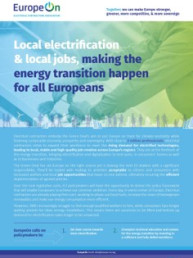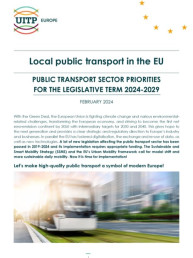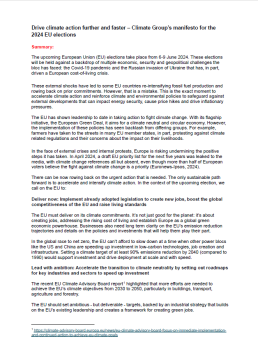Urgent Statement: Reversing the 2035 zero emission cars goal will harm EU industry
Urgent Statement
Reversing the 2035 zero emission cars goal will harm EU industry
12th June 2024,
Brussels
The Platform for Electromobility is very concerned by recent statements calling on the incoming European Commission to reverse the already agreed on CO2 Standards for cars and vans. Today, the 2035 zero emission cars goal is Europe’s most straight-forward EV industrial strategy bringing vital investment to European companies.
We strongly warn against undermining key EU legislation already agreed by MEPs and EU countries in the last legislative period.
Attracting investment to create the net-zero industrial ecosystem for zero-emission mobility is not possible without a consistent, clear regulatory framework.
To “hit reverse” now would also significantly penalise all industrial actors, including many of our members, who have already invested in this transition (automotive, batteries, infrastructure, etc.).
The cars and vans CO2 legislation, as agreed by the European Parliament and the Council of the European Union in 2023, is also in the interest of European consumers: it will increase the offer and promote the market uptake of zero-emission vehicles. With an increased market, zero-emissions vehicles will become more affordable with a continuously reduced total cost of ownership and there will be more choice for consumers. This will also help tackle air quality and noise issues, further benefitting European citizens.
The Platform for Electromobility, a 47-member strong alliance, urges the incoming European Commission President to safeguard the agreement settled between the Parliament and the Council ensuring all new cars and vans sold by 2035 will be zero-emission. Reneging on this deal not only puts at risk the EU’s goal to fully decarbonise road transport by 2050 but undermines Europe’s re-industrialisation efforts and global competitiveness.
[Video] Charles Esser highlights importance of coordination and cooperation between grid stakeholders.
Energy & Industry
Rise of electric vehicles, fall of the power grid?
The smooth integration of electric mobility into the power grid is the next frontier on the path toward clean mobility. The Platform for Electromobility issued a 15-solutions strong recommendations paper to ensure a smooth integration. Charles Esser highlighes here some key points and invites you to join the debate with key transport manufacturers.
Electric Vehicles are “battery-on-wheels”. What does that mean? With the right policy framework, smart charging can smoothen the impact of EVs on the grid.
But what’s more, the millions on new electrified vehicles in Europe can actually be used as assets to support the grid when it is under stress with Vehicle-to-Grid technologies.
We recently published with other members of the Platform, a roadmap of 15 solutions for a smooth integration of e-mobility into the grid. I won’t cover them all here but would like to underline one point:
One of the main challenges in planning the electrical grid in a way that can absorb charging of EVs lies in the uncertainty about how different types of EVs will recharge in different places.
The key to success here is early communication, coordination and collaboration between stakeholders: this includes the DSOs that we represent, but also local authorities, charge point operators, energy companies, fleet managers and so on.
While the Platform for Electromobility helps us get closer to each other, we call on European authorities to initiate, moderate and formalize this collaboration.
In a few weeks at the European Sustainable Energy Week in Brussels, I will be discussing all this from the point of view of European industries at our EUSEW session on 11 June in the late afternoon.
We gathered major European clean transport manufacturers across different modes to understand how upcoming European energy policies can help them be at the same time more competitive, more sustainable with a minimum, or maybe even positive, impact on the power grid.
Make sure to join us! You’ll find the registration link under this video. See you there!
Electromobility Stakeholders' Manifesto Compilation for 2024-2029
EU Elections
Compilation of Electromobility Stakeholders' Manifestos for 2024-2029
A unique document for policy-makers to tackle challenges ahead of us and make electric mobility transition a success for people, climate and businesses.
Europe’s future, decarbonised mobility ecosystem will be composed by a myriad of stakeholders. To make the energy transition a success, they all present both specific and cross-sectoral needs. All presented in this unique document.
Hereby, we present a unique compilation of the political manifestos from several members of the Platform for Electromobility. It stands as a testament to the collective effort and unified vision driving the advancement of electric mobility across all sustainable modes of transportation; but also showcases the diversity of legislative measures and political steps that remain to be taken for each and every sectors.
Within these manifestos lie the cornerstone recommendations crucial for the development and integration of electric mobility into European societies and economies. They stem from a diverse range of entities spanning industries, associations, NGOs, and local authorities, underscoring the breadth and depth of stakeholder involvement in shaping the decarbonised mobility ecosystem. As we approach the EU elections, this consolidated document serves as an exceptional resource for policymakers and stakeholders alike, providing them with a comprehensive overview of the priorities and aspirations of all the sectors composing the clean mobility system of tomorrow.
Transpiring from all manifestos presented here are cross-sectoral imperatives captured by the triple priority : Implement, Invest, Industrialise. Implement the Green Deal’s legislative measures. Invest to make the Green Deal a concrete reality. And industrialise to make the Green Deal beneficial for all Europeans, climate, people and businesses alike. These overarching goals gathered in the Platform for Electromobility’s manifesto, represent the pillars upon which our collective success rests. I invite you to delve into this compilation and explore the nuanced perspectives and unique contributions of each sector. Each of them is a milestone on the path towards a sustainable, electrified mobility.
Access each individual manifesto for 2024-2029 below.
Open Letter to Prof. Draghi and EU Heads of States on EU Competitiveness Strategy
Open letter
Platform Chair: Prioritizing EU Competitiveness in the Transport Sector
to Prof. Mario Draghi and EU Heads of States
Industrial competitiveness will be high on the agenda of the Special European Council of 17th and 18th April in Brussels. It has lately tended to overshadow sustainability. We, members of the Platform for Electromobility, a unique coalition of industries, NGOs, and civil society organizations committed to advancing electric mobility across all modes of transportation in Europe, firmly believe there can be no industrial competitiveness without sustainability. The Green Deal has set the course. It is imperative to implement it swiftly and continue in that direction.
The EU does need an industrial strategy to ensure its businesses can complete the transition as planned. In our latest publication, “A 360° e-mobility industry strategy“, you will find five recommendations we believe should be a priority of the next strategic agenda:
-
Ensuring regulatory stability for industries and investors. This means first and foremost ensuring that the European Green Deal legislations as voted in the 2019-2024 mandate remain steady over time.
-
Enhancing value chain competitiveness and resilience. European industrial policy initiatives should see their focus widened from specific components to a more comprehensive approach, spanning from raw materials to end products and from individual to all modes of sustainable transportation.
-
Financing the short-term transition through accessible opportunities. Existing EU funds can already serve as valuable assets if they are distributed efficiently and intelligently, notably by streamlining access to finance, particularly for net-zero industries, through instruments such as the Innovation Fund and InvestEU.
-
Establishing a Net Zero Investment Plan for long-term financing. The STEP platform, although welcomed, unfortunately far from the pan-European response to global competition on cleantech that the EU needs.
-
Strengthening international cooperation. Strengthening ties with diverse regions would diversify sources, reduce geopolitical risks and uncertainties, ensure a secure supply chain, enhance global industrial collaborations, and uphold a fair competitive environment for all clean transport industries.
We urge the European Council and the upcoming report of the future of European Competitiveness to recognise that industrial competitiveness and sustainability are intrinsically linked and cannot go one without the other. Hoping that our recommendations will help shape the policy priorities of the upcoming EU legislative cycle, we stand ready to contribute to the discussions further.
Céline Domecq
Chair of the Platform for Electromobility, 2024
[Video] Charging Infrastructures: A perspective on 2024 by Jayson Dong
2024: Entry into force of AFIR
Jayson Dong, chair of the WG Infrastructures of the Platform for Electromobility, outlines the upcoming opportunities and challenges entailed by the implementation of AFIR in 2024.























